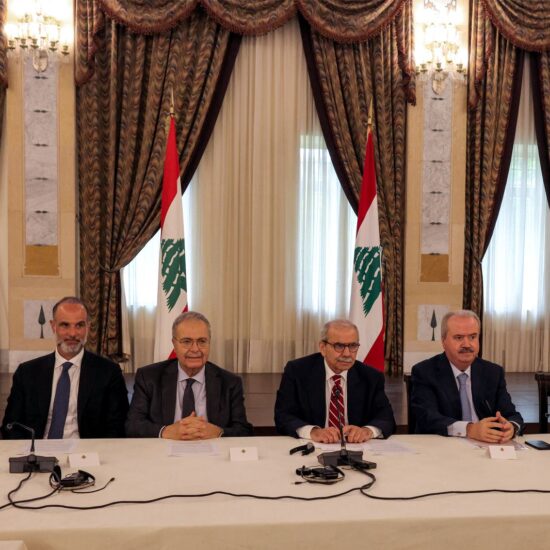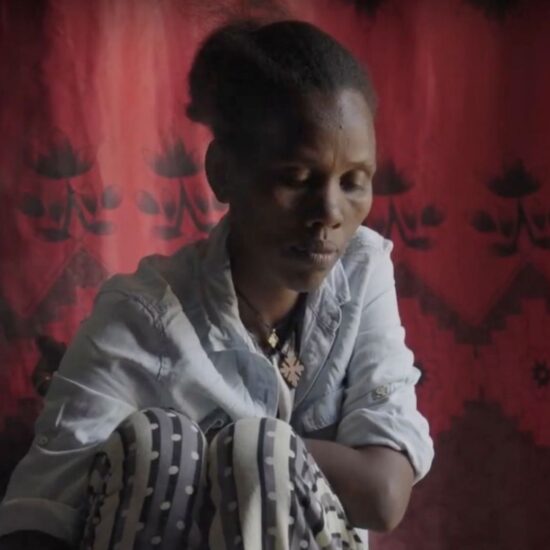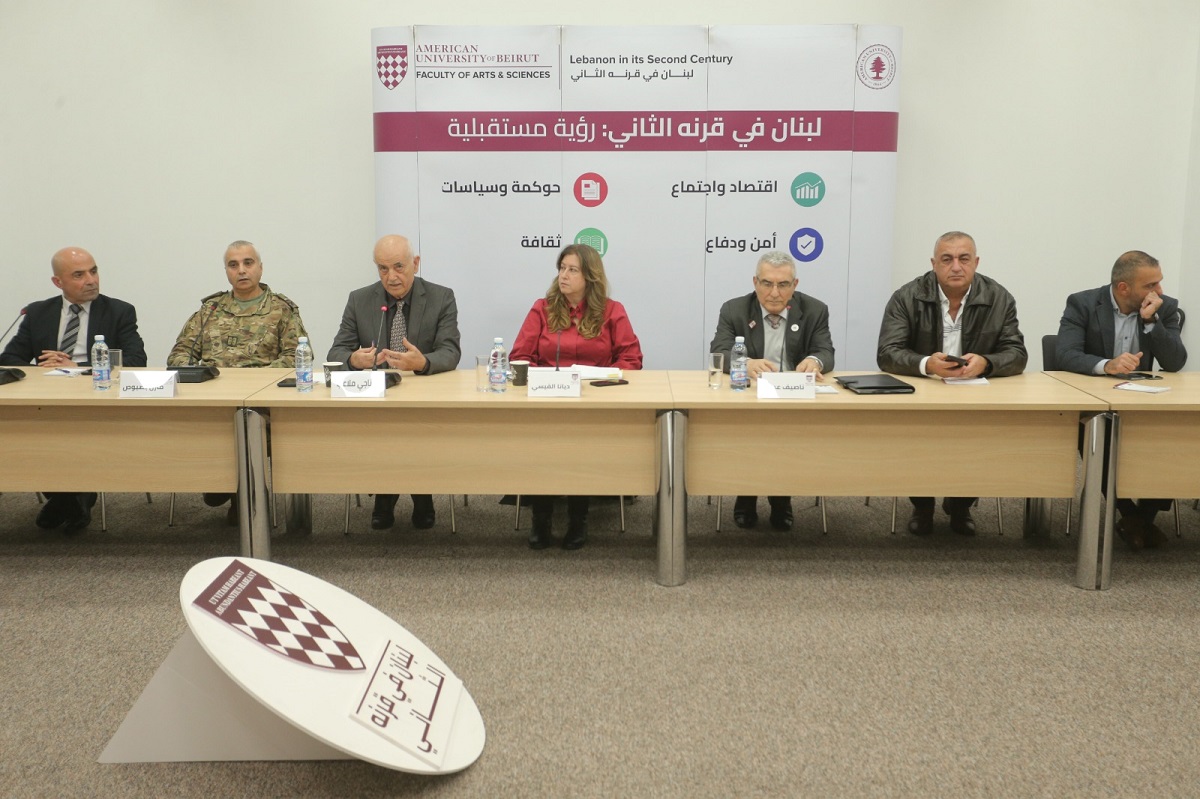
Lebanon and Israel, despite having in principle maritime and land demarcation agreements, remain technically at war, with unresolved disputes in the Shebaa Farms and non-conclusive agreements on both borders. In a significant development, the two countries reached an accord in October 2022 to end their longstanding dispute over the maritime border, paving the way for offshore energy exploration in the Mediterranean Sea. This agreement, facilitated by Amos Hochstein, the US Department of State’s energy envoy, marks a crucial step in their relations.
The land border issue, however, presents a more complex challenge. In June 2000, the United Nations was tasked with delineating the Lebanese border to ascertain Israel’s full withdrawal from Lebanon, as per UN Security Council Resolution 425. This delineation resulted in the creation of what is known as the Blue Line. Notably, the United Nations was not required to address the legality of the boundary between Lebanon and the Israeli-controlled Golan Heights for the purpose of this resolution, thereby explicitly distinguishing the Armistice Demarcation Line between Lebanon and the Israeli-controlled Golan Heights from the Blue Line.
The maritime agreement aimed to establish a border between Lebanese and Israeli waters for the first time, primarily along a line referred to as Line 23. Lebanon had reservations about Line 23 in the negotiations, as it implied ceding a portion of the Karish field to Israel, sharing the Qana gas field, and diminishing the areas of Blocks 8 and 9 under Lebanese control.
In the context of the “Lebanon in its Second Century: A Vision for the Future” project, the Faculty of Arts and Sciences, and the Department of History and Archaeology organized a seminar titled “The Future of Lebanon: The maritime and land demarcation and the future of the oil sector.” The conference, moderated by retired dean and military strategic researcher Naji Malaeb, included four sessions.
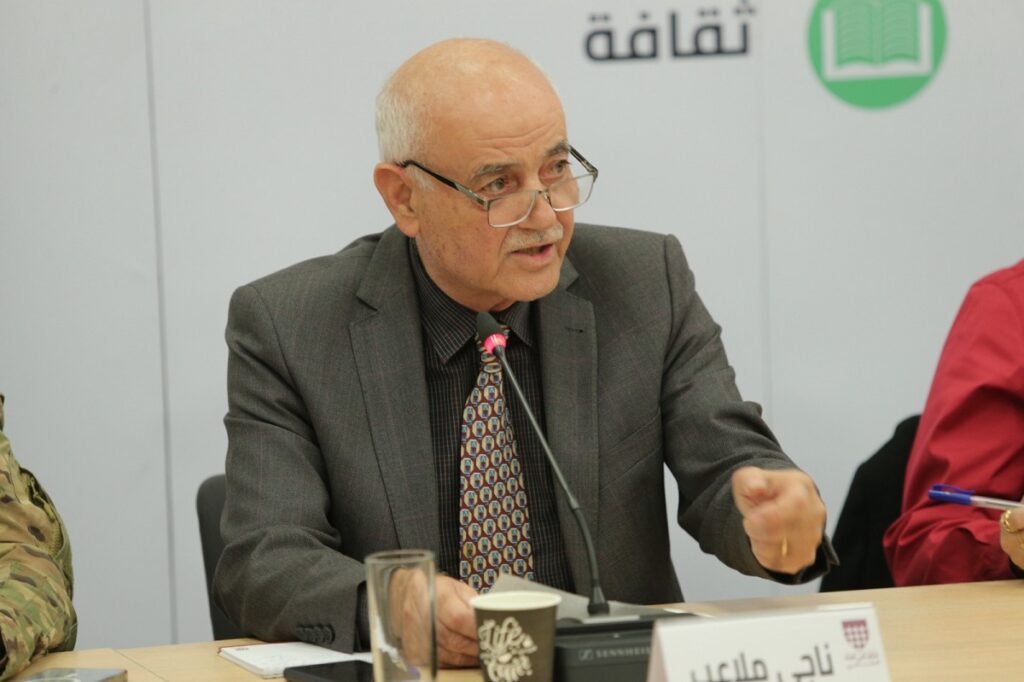
Naji Malaeb, retired dean and military strategic researcher
During the first session, “The International Land Borders Between Lebanon and Occupied Palestine, Challenges of the Blue Line,” Retired Brigadier General Khalil Al Gemayel discussed the complexities of the southern borders, delimited by Ras Naqoura and ending at Mount Hermon. He raised concerns about the identity of the village of Ghajar and the Shebaa Farms, asserting that “all changes after the Sykes-Picot Agreement were at the expense of Lebanon’s interest.” Al-Jamal pointed out, “Currently, Lebanon approves only the mentioned Armistice Line in the 1948 agreement, which is an error-free line, whereas the Blue Line is not an international border but a withdrawal line established in 2000.” He also highlighted Lebanon’s 13 reservations about the Blue Line, which “trespasses on Lebanese territory at 268 points,” and the continuous violations, including 18 permanent breaches where Israel occupies 719,452 square meters, with Syrian residents in Lebanese territory holding Israeli citizenship. He mentioned the Naqoura tunnel, a 60-meter-long structure in Lebanese territory, now used by Israelis as a tourist landmark.
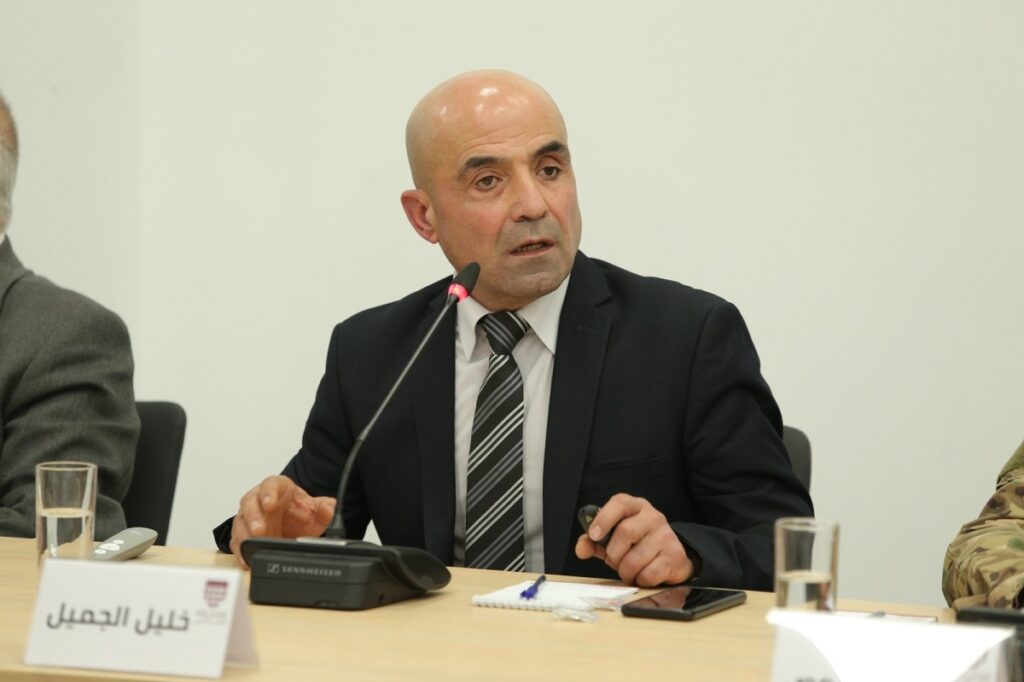
General Khalil Al-Gemayel, Retired Brigadier
In the second session, “The Delimitation Agreement Between Lebanon and the Israeli Entity and the Role of the Army in Maritime Border Delimitation,” Brigadier General Mazen Basbous from the Marine Corps revealed that “Lebanon’s dispute over maritime borders with Israel began in 2011 as a result of the incorrect delimitation with Cyprus in 2007.” He explained that “Lebanon retreated from the southern tripoint to point (1), and Israel took advantage to delineate its borders with Lebanon from Naqoura to this point.” This resulted in Israel trespassing on 860 square kilometers of Lebanese waters. “In July 2011, we discovered that our borders are at line 29, not 23, and Lebanon lost more than 1430 km² of its maritime borders in addition to the 860 km²,” he said. Basbous highlighted the significance of the Karish field in the disputed area and Lebanon’s efforts to formalize the trespassing issue. “We sent the matter, which includes line 29, to the Council of Ministers,” he stated, noting that it was not presented at the time. The Lebanese President’s subsequent actions and the negotiations in Naqoura ultimately led to the Israelis agreeing to abandon line (1), thus recovering 860 km² and liberating southern Lebanese oil blocks (8, 9, 10). However, Basbous criticized the high-level signing of the delineation agreement, which Israel registered as an international treaty at the United Nations based on the Vienna Convention on the Law of Treaties, citing flaws such as the continued occupation of the Tafavats area near Naqoura and Israeli conditions on Lebanese Block 9.
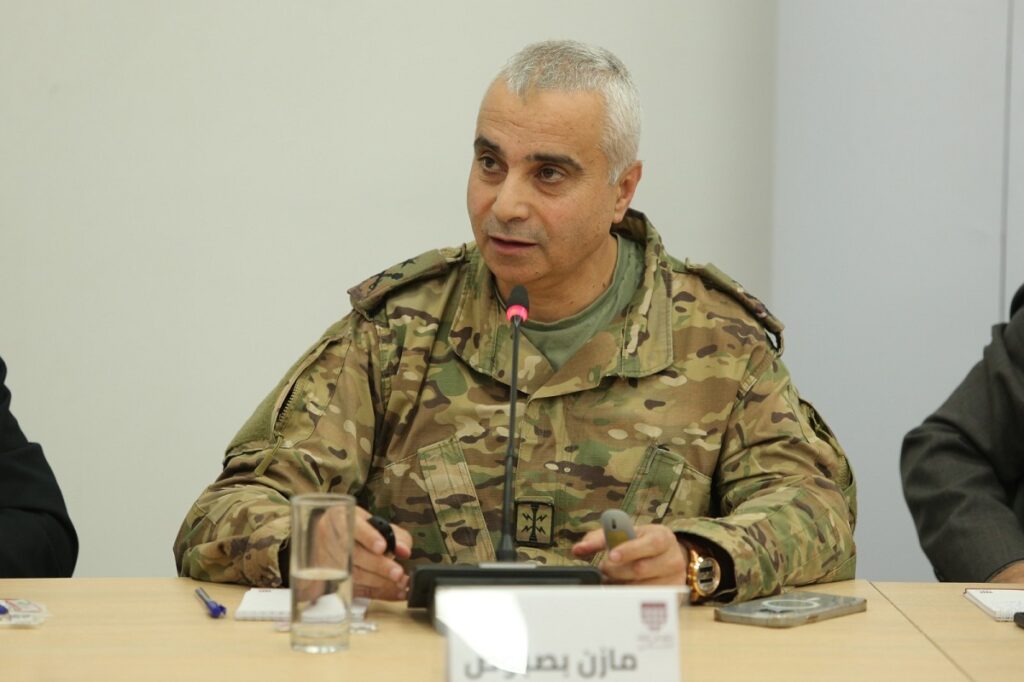
Brigadier General Mazen Basbous
In the third session titled “The Energy Sector in Lebanon: From the Perspective of Good Governance,” Diana Kaissi, an expert in energy governance, highlighted the compounded crisis in Lebanon’s energy sector, including in electricity, renewable energy, and the overstepping of the Public Procurement Authority’s powers. She underscored the importance of learning from past mistakes and implementing practical reforms. Kaissi emphasized the need for comprehensive problem-solving, involving consultations with all stakeholders and the engagement of specialized Lebanese experts. She also advocated for the inclusion of renewable energy alongside oil, gas, and electricity in Lebanon’s energy strategy.
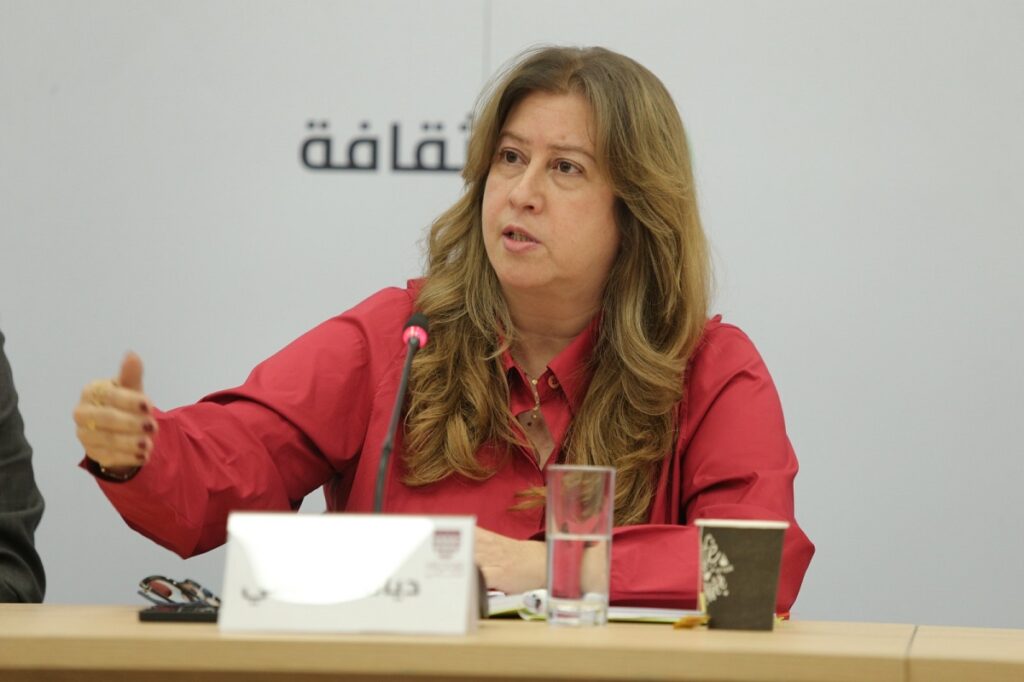
Diana Kaissi, an expert in energy governance
Kaissi pointed out that although Lebanon’s laws contain beneficial provisions, such as the Electricity Law mandating the establishment of a regulatory authority for the electricity sector, this authority has yet to be formed. She also noted the issue with the Petroleum Administration Authority, which, due to delayed approval, operates with only three members instead of the required six and struggles with a minimal budget, severely hindering its functionality. Kaissi argued for clearly defined ministerial powers and underscored the critical role of the Lebanese army in safeguarding the country’s maritime borders.
She stressed the importance of transparency in utility ownership, advocating for the disclosure of the real owners and economic beneficiaries of all energy companies operating in Lebanon. Kaissi called for the establishment of a regulatory authority for electricity, to avoid granting undue privileges to the Cabinet in licensing renewable energy projects. She also urged for a comprehensive audit and the publication of the findings in the accounts of the Banque du Liban, including revenues from seismic survey sales.
Kaissi highlighted the urgent need for approving the National Oil Spill Response Plan, pointing out the unpreparedness of ministries for oil spills and leaving the responsibility to voluntary associations. She criticized the Rosenhaft contract related to the rehabilitation of Tripoli’s oil facilities as flawed and unjust, urging the state to reconsider this contract and explore beneficial use of the facilities.
In the fourth session titled “National Security Challenges – Defining and Protecting National Security Borders,” retired Colonel Nasseef Obeid, Secretary-General of the “Loyalty to the Nation for Research and Studies” center, discussed the criticality of defining national security borders to protect Lebanon’s sovereignty. He addressed the complexity of defending national interests against multiple threats and the need for a comprehensive national strategy.
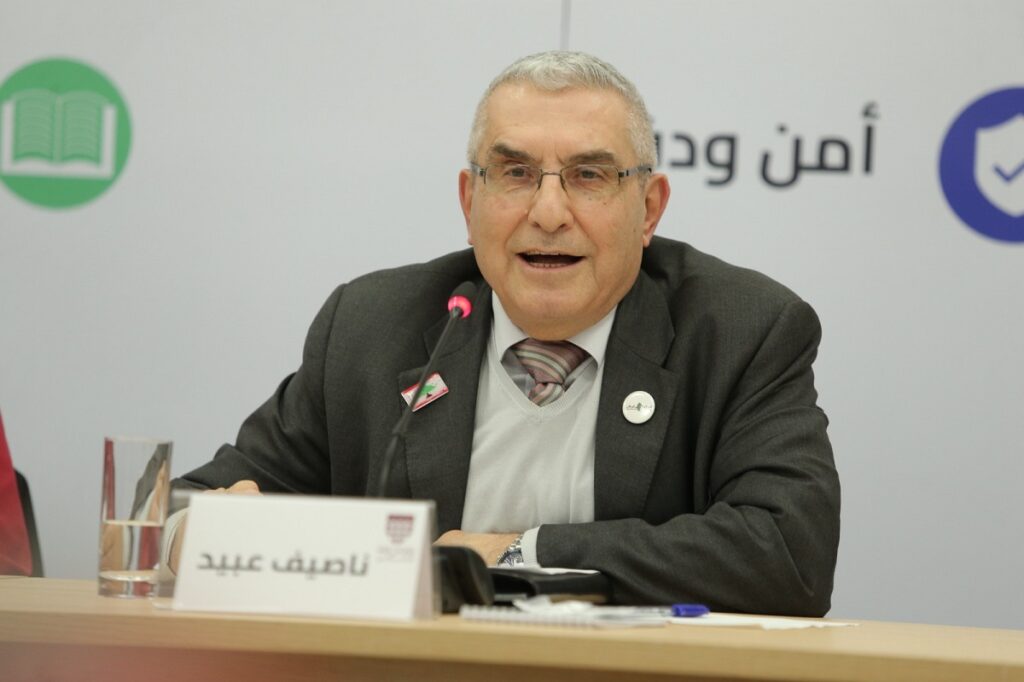
Nasseef Obeid, retired Colonel
Obeid proposed several measures for safeguarding national interests:
– Establishment of the National Security Council.
– Creation of the National Authority to promote national unity, fostering national identity, dialogue culture, and unity in diversity.
– Establishment of the National Administration Training Institute.
– Approval of the optional national service project.
– Strengthening of official schools and universities.
Regarding maritime border demarcation and oil, Lebanon announced on October 12th that exploratory drilling in offshore Block 9 did not yield hydrocarbon finds. Despite this, the council of ministers ratified a law for creating a Sovereign Wealth Fund (SWF) to manage oil and gas sector revenues for Lebanon’s economic benefit.
Under the terms of the maritime agreement, Israel retains full rights to the Karish field, while Lebanon holds rights to Qana, albeit with a stipulation. The agreement allows Israel a share of royalties from the Qana field, facilitated through a side agreement with Total, the French company operating Block 9.
Experts have identified a significant loophole in the agreement: the absence of a specified profit distribution arrangement. The deal postpones the decision on Israel’s royalties from the Qana field, complicating the future determination of these payments. This situation is reminiscent of the prolonged negotiations between Cyprus and Israel over profit distribution for the Aphrodite-Yishai joint reservoir.
Beirut’s insistence on Line 29, further south than Line 23, indicates a potential loss of approximately 1,800 square kilometers. Facing economic collapse, Beirut views the maritime deal as an opportunity to attract foreign investment and alleviate the economic crisis.
However, the potential of gas exploitation to reduce the government’s debt of about $100 billion remains uncertain, as sufficient gas quantities for viable extraction were not found at the Qana reservoir. Even in an optimistic scenario with more than 15 trillion cubic feet of natural gas reserves, revenues could have reached up to $6 billion over 15 years.
Lebanon’s lack of mechanisms, including a sovereign wealth fund and a fiscal act, raises concerns about its capacity to effectively govern the oil and gas sector. The agreement also holds promise for Europe, offering an alternative to Russian gas amidst geopolitical tensions, with the Karish field potentially becoming a key resource for European energy needs.
Maan Barazy is an economist and founder and president of the National Council of Entrepreneurship and Innovation. He tweets @maanbarazy.
The views in this story reflect those of the author alone and do not necessarily reflect the beliefs of NOW.



